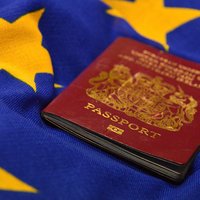Digital Product Passports Key to Driving Carbon Neutral Decisions
New report explores the benefits to store and share information throughout a product's life cycle

New report explores the benefits to store and share information throughout a product's life cycle

The Taskforce for climate neutral and circular materials and products at the University of Cambridge Institute for Sustainability Leadership published in collaboration with international think tank Wuppertal Institute the study "Digital Product Passport: the ticket to achieving a climate neutral and circular European economy?". Within the report, the authors explore the benefits of digital product passports to store and share information throughout a product's life cycle and finds the system could be key to helping consumers make better-informed choices and incentivising producers to increase the sustainability of their products.
In their report "Digital Product Passport: the ticket to achieving a climate neutral and circular European economy?" the authors argue that a product passport system would provide industry stakeholders, businesses, public authorities, and consumers with a better understanding of the materials used in the product as well as their embodied environmental impact.
In the context of the COVID-19 pandemic, the Russian invasion of Ukraine and the cost-of-living crisis, the report suggests it is critical to transform economic and business models, while addressing the huge scale of material consumption and related emissions. In addition, the report concludes Digital Product Passports (DPPs) can accelerate the twin green and digital transitions as part of EU efforts to deliver positive climate action and sustainable economies.
Eliot Whittington, Director of Policy, University of Cambridge Institute for Sustainability Leadership said: "The war in Ukraine is underlining that it is essential that we live within our means and find ways to be more geopolitically independent with our materials in Europe. A well-designed Digital Product Passport will be an invaluable policy and business tool in support of this goal, as it will enable businesses to create more sustainable and circular materials and products by monitoring how they are made throughout the supply chain. It will also support consumers to make well-informed choices based upon sustainability criteria. This could be game-changing in the effort to build a European circular economy."
The report shows widespread agreement amongst business leaders that product passports could have both short- and longer-term benefits, improving access to reliable and comparable product sustainability information for businesses, consumers and policymakers, and suggests the system offers an opportunity to modernise and digitalise product information to support industry transformation towards carbon neutrality and increased circularity.
Prof. Dr.-Ing. Manfred Fischedick, Scientific Managing Director of the Wuppertal Institute, said: "The EU fosters digitalisation and the transformation towards a climate-neutral, sustainable economy and describes this parallel process as the green and digital 'twin' transition. A Digital Product Passport as envisaged in the EU’s European Green Deal and Circular Economy Action Plan is a great opportunity to modernise product information throughout the entire value chain. DPPs could be a big step forward for more sustainable products and consumption, boosting energy and resource efficiency by enabling new business models based on e.g. digital data sharing. DPPs could also substantially contribute to an improved security of energy and material supply for a resilient economy."
A DPP can unify information, making it more readily accessible to all actors in the supply chain. This will support businesses to ensure an effective transformation towards a decarbonised industry. It could also create incentives for companies to make their products more sustainable, as improving access to reliable and consistent information across supply chains will make it easier for customers to make comparisons.
The introduction of the DPP would deliver a wide range of benefits including:
- Access to reliable and comparable product sustainability information for businesses and policymakers, and also information to address product liability challenges more broadly.
- Access for consumers to information that enables them to make more informed and sustainable choices.
- Increased transparency, traceability and consistency for each player in each part of the value chain.
- Support for companies to monitor and report against sustainability indicators and claims through a digital tool.
- A tool that can facilitate innovative thinking on circularity and new practices.
- Potentially an enabler for the development of completely new business models.
- New data sources that can enable sustainable investment decisions.
- Enabling resource optimisation as well as energy efficiency strategies.
Joint Press Release
Wuppertal Institute for Climate, Environment and Energy
Responsible for content: Prof. Dr.-Ing. Manfred Fischedick, Scientific Managing Director
Contact: Christin Hasken, Head of Communications
Tel.: +49 202 2492-187
Email: christin.hasken@wupperinst.org
Taskforce for climate neutral and circular materials and products
Media enquiries to: Pascale Palmer, Senior Media Advisor
Tel: +7432 533 080
Email: pascale.palmer@cisl.cam.ac.uk
